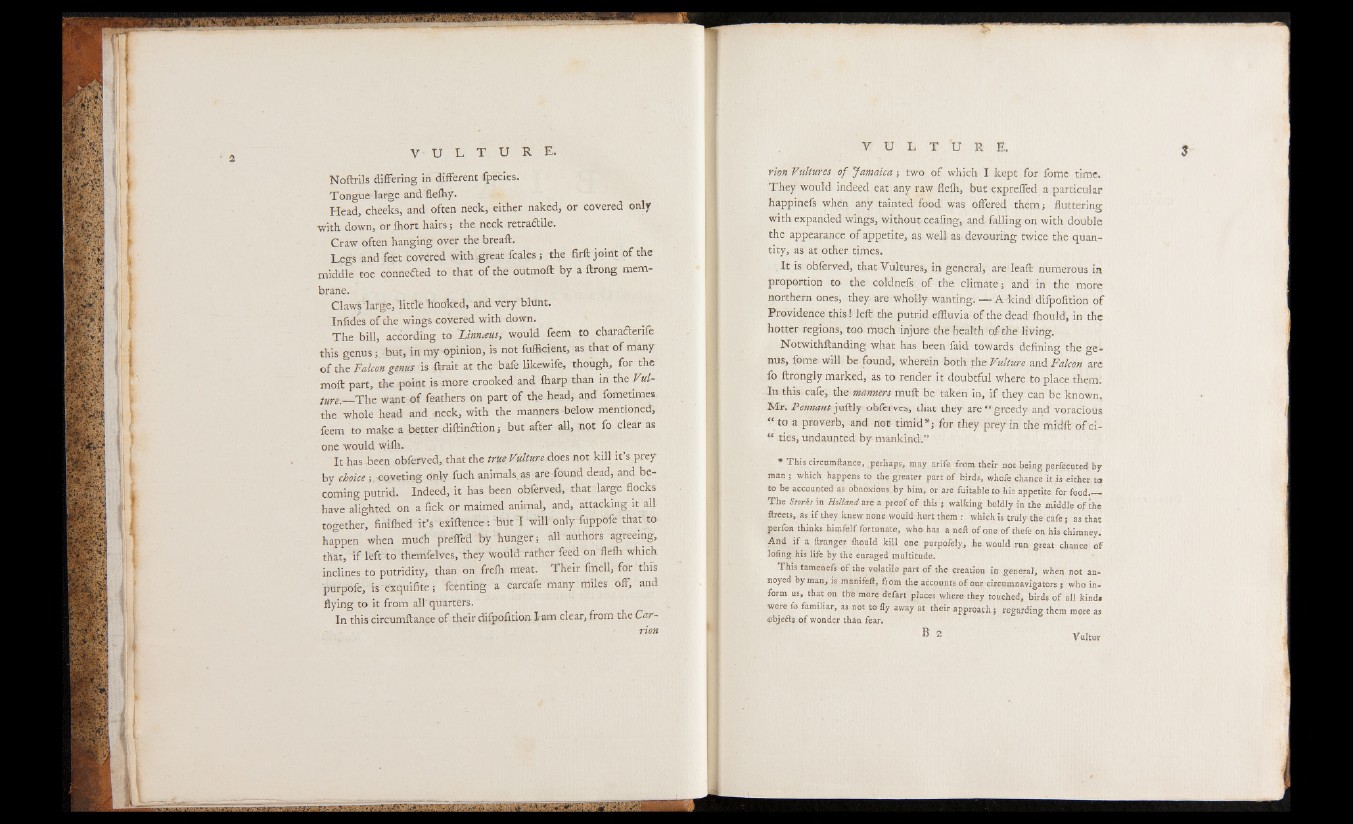
Noftrils differing in different fpecies.
Tongue laFge and flefhy.
Head, cheeks, and often neck, either naked, or covered only
■ with down, or fhort hairs; the neck retraftile.
Craw often hanging over the breaft.
Legs and feet covered with great fcales ; the firft joint of the
middle toe connefted to that of the outmoft by a ftrong membrane.
Claws large, little hooked, and very blunt.
Infides of the wings covered with down.
The bill, according to Linnaus, would feem to chara&erife
this genus; but, in my opinion, is not fufficient, as that of many
of the Falcon genus is ft-rait at the bafe likewife, though, for the
moft part, the point is more crooked and Iharp than in the Vulture_
The want of feathers on part of the head, and fometimes.
the whole head and neck, with the manners below mentioned-,
feem to make a better diftinftion ; but after all, not lo clear as
one would wifh.
It has been obferved, that the true Vulture does not kill it’s prey
by choice;. -coveting only fuch animals, as are-found dead, and becoming
putrid. Indeed, it has been obferved, that large flocks
have alighted on a fick or maimed animal, and, attacking it all
together, finifhed it’s exiftence: but I will Only fuppofe that to
happen when much preffed by hunger; all authors agreeing,
that, if left to themfelves, they would rather feed on flefh which
inclines to putridity, than on frelh meat. Their fmell, for this
ptirpofe, is'dxquifite; fcenting a carcafe many miles off, and
flying to it from all' quarters.
In this circumftance of their difpofition I am clear, from the Carrion
Vultures of Jamaica; two of which I kept for fome time.
They would indeed eat any raw flelh, but expreffed a particular
happinefs when any tainted food was offered them; fluttering
with expanded wings, without ceafing, and falling on with double
the appearance of appetite, as well as devouring twice the quantity,
as at other times.
It is obferved, that Vultures, in general, are leaft numerous in
proportion to the coldnefs of the climate; and in the more
northern ones, they are wholly wanting. — A kind difpofition of
Providence this! left the putrid effluvia of the dead fhould, in the
hotter regions, too much injure the health of the living.
Notwithftanding what has been faid towards defining the genus,
fome will be found, wherein both the Vulture and Falcon are
fo ftrongly marked, as to render it doubtful where to place them.
In this cafe, the manners muft be taken in, if they can be known.
Mr. Pennant juftly obferves, that they are “ greedy and voracious
“ to a proverb, and not- timid*; for they prey in the midft ofci-
“ ties, undaunted by mankind.”
This circumftance, perhaps, may arife from their not being perlecuted by
man ; which happens to the greater part of birds, whofe chance it is either to
to be accounted as obnoxious, by him, or are fuitabie to his appetite for food__
The Storks in Holland are a proof of this ; walking boldly in the middle of the
ftreets, as if they knew none would hurt them : which is truly the cafe; as that
perfon thinks himfelf fortunate, who has a neft of one of thefe on his chimney.
And if a ftranger Ihould kill one purpofely, he would run great chance of
lofing his life by the enraged multitude.
This tamenefs of the volatile part of the creation in general, when not an-
noyed by man, is manifeft, fj om the accounts of our circumnavigators ; who inform
us, that on thh more defart places where they touched, birds of all kind»
were fo familiar, as not to fly away at their approach; regarding them more as
objedts of wonder than fear.
B 2 Vultur